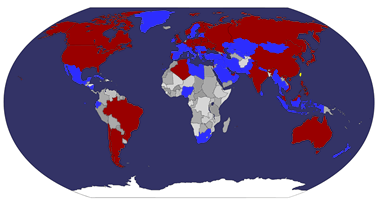30ème anniversaire de mouvement pour la démocratie de Gwangju


The Gwangju Democratization Movement (Hangeul:광주 민주화 운동, Hanja: 光州民主化運動) or simply Gwangju Uprising refers to a popular rebellion in the city of Gwangju, South Korea from May 18 to May 27, 1980. During this period, citizens rose up against government and took control of the city. In the course of the uprising, insurgents took up arms, but were ultimately crushed by the ROK Army. The event is sometimes called 518, in reference to the date the uprising began.
The events of May 1980 were not a deliberate plot by the ROK government to massacre innocent civilians in South Cholla Province. Nor was the U.S. involved in the incident. Given the extent of the insurrection, the death toll was remarkably low: a fact that reflects the ROK government's efforts to minimize casualties. Those who continue to distort what happened at Kwangju should have their motives questioned. They seem determined to prevent the wounds from healing and to drive a wedge between the U.S. and the Korean people.
During 1980s, the incident was represented in official reports as a rebellion inspired by Communist sympathizers. But after civil rule was reinstated, the incident received recognition as an effort to defend democracy from military usurpation. Therefore, so called Kwangju Democratization Movement. However, there are claims supporting the official report. In South Korean media several North Korean refugees, including former Korean People's Army (KPA) members, claimed that the rebellion was truly supported by special KPA agents. In 1997, former presidents Chun Doo-hwan and Roh Tae-woo, as well as 17 others, were convicted and subsequently pardoned for their "connections with the December 12, 1979 coup, the Gwangju Uprising, and slush funds." By 2002, a national cemetery and day of commemoration (May 18), along with acts to "compensate, and restore honor" to victims, were established.
Le mouvement pour la démocratisation de Gwangju (Hangeul:광주 민주화 운동 , Hanja: 光州民主化運動) est un soulèvement populaire prenant place dans le centre-ville de Gwangju en Corée du Sud, amorcé le 18 mai 1980. Au cours de ce mouvement, les citoyens s'élèveront contre la dictature en place et prendront le contrôle du centre-ville avant d'être sévèrement réprimés par l'armée qui reprendra le contrôle des lieux le 27 mai. Gwangju était le fief du leader de l'opposition démocrate, Kim Dae-jung, qui fut condamné à mort après ces émeutes, puis gracié par la suite.
Pendant le règne de Chun Doo-hwan, cet événement était présenté comme une révolte inspirée par des sympathisants communistes, mais une fois qu'un régime civil a été mis en place, il a été reconnu qu'il s'agissait d'un mouvement ayant pour but de défendre la démocratie contre la dictature militaire. En 1997, les anciens présidents Chun Doo-hwan et Roh Tae-woo ont été jugés coupables, avec 17 autres accusés, pour leurs "liens avec le coup d'État du 12 décembre 1979, le soulèvement de Gwangju et des fonds secrets", pour être par la suite graciés. En 2002 furent créés un cimetière national et une journée commémorative (le 18 mai), pour "compenser" les victimes et "restaurer leur honneur".
Cet événement est généralement appelé "5 1 8" ("오일팔", prononcé "o il pal", c'est-à-dire "cinq un huit" en français) en coréen, en référence à la date du soulèvement (avec, dans l'ordre, le mois et le jour).










.jpg)






















 taiwan
taiwan  cover or postcard
cover or postcard  FDC
FDC 






























































































No comments:
Post a Comment